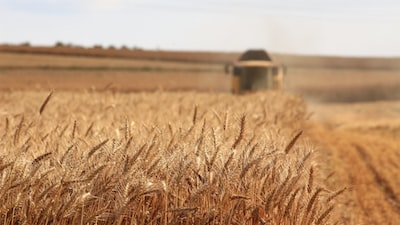
Farm to table has become a buzzword in the culinary world, but what does it really mean? It signifies a movement towards sourcing food directly from local farms and producers, cutting out the middleman and ensuring fresher, healthier ingredients. This trend is not just a fad – it’s a shift towards a more sustainable and ethical way of eating.
By supporting farm to table practices, we are able to reduce our carbon footprint, support small farmers, and enjoy food that tastes better and is better for us. So next time you sit down for a meal, think about where your food comes from and consider making the switch to farm to table.
It’s a small change that can make a big difference.
Table of Contents
Benefits of Sustainable Farming Methods:
By implementing eco-friendly practices like crop rotation, organic farming, and precision agriculture technologies, farmers can improve soil health, reduce pollution, and enhance biodiversity. These methods not only contribute to sustainable food production but also support local communities and economies. Embracing sustainable agriculture is a pivotal step towards creating a more resilient and environmentally conscious food system for generations to come.
Environmental protection
Farmers can keep soil healthy, cut pollution, and protect biodiversity by using crop rotation and organic farming methods. Sustainable food production benefits communities by providing healthier food and boosting local economies. These practices promote environmental awareness and help create a strong food system that can handle challenges like climate change and resource limits. Fair trade partnerships and supporting small-scale farming initiatives also make a positive impact at both local and global levels.
Healthier food options
Sustainable farming prioritizes soil health, resulting in nutrient-rich fruits and vegetables. By promoting biodiversity and reducing synthetic pesticides, this method ensures that the food we eat is both healthy for our bodies and the environment. Embracing these practices supports a healthier lifestyle and benefits individuals and the planet. Additionally, sustainable agriculture connects consumers to their food sources, increasing awareness of production methods.
Choosing products from sustainable farming supports environmentally friendly practices. This transparency in the supply chain empowers individuals to make informed choices that benefit themselves, the community, and future generations. Opting for healthier options from sustainable farming is a meaningful step towards a more sustainable and ethical food system.
Economic sustainability
Sustainable agriculture aims to meet current food needs while preserving resources for future generations. By considering the environment, economy, and society, this approach creates a strong and ethical food system. Through techniques like crop rotation and pest management, agricultural sustainability supports both the environment and community well-being.
Innovative Practices in Sustainable Agriculture:
Crop rotation, organic farming, and integrated pest management help improve soil health and reduce the use of harmful chemicals. This benefits the environment and consumer health. Sustainable agriculture enables farmers to create a resilient food system, ensuring long-term productivity and sustainable livelihoods for future generations.
The move towards sustainable practices in agriculture is crucial for addressing global food security challenges. By adopting innovative techniques like precision agriculture, agroforestry, and water conservation methods, farmers can boost productivity while minimizing environmental harm. This agricultural transformation supports biodiversity conservation and climate resilience, and fosters community well-being by promoting economic growth and social development.
Organic farming techniques
Organic farmers use natural methods like crop rotation, composting, and beneficial insects to manage pests and enrich the soil. These practices produce food free of harmful chemicals and promote sustainability for future generations. Furthermore, organic farming encourages practices like water conservation, minimal tillage, and protection of wildlife habitats. This holistic approach aims to minimize environmental impact while producing nutritious food. Adopting organic farming techniques supports biodiversity, reduces the carbon footprint of agriculture, and ensures the long-term viability of our food systems.
Crop rotation and cover crops
Rotating crops keeps soil fertile, reduces pests and disease, and prevents erosion. This method breaks pest cycles, cuts chemical use, and enhances soil structure. Also, crop rotation boosts biodiversity, increases plant nutrients, and strengthens agricultural productivity. Farmers see higher yields, healthier soil, and improved sustainability with crop rotation.
Precision agriculture technology
Farmers can collect real-time data on soil conditions, water usage, and crop health. This helps them make better decisions to improve productivity and reduce environmental impact. By using advanced technology for precision planting, fertilizing, and irrigation, farmers can use resources more efficiently and increase crop yields. Precision agriculture reduces costs, boosts efficiency, and supports sustainability by cutting waste and environmental harm.
Impact of Sustainable Farming on Communities:
Supporting local farmers who use sustainable methods benefits communities by providing fresh, healthy produce. This also strengthens community bonds and encourages residents to lead healthier lives. Sustainable farming can lead to economic growth by creating partnerships with local businesses, farmer’s markets, and restaurants, ultimately boosting the local economy and improving community well-being.
Local food movements
Consumers are turning to farmers’ markets, CSA programs, and farm-to-table restaurants for locally grown food. By joining these movements, people support a sustainable food system, enhance food quality and taste, and build closer producer-consumer relationships. They emphasize honesty, ethical practices, and environmental responsibility, creating a sense of community and enhancing overall well-being.
Fair trade partnerships
Fair trade partnerships prioritize social and environmental responsibility by aiming to empower farmers economically and promote community development. By engaging in fair trade, consumers can contribute to a more equitable global trade system that values transparency and ethical standards. These partnerships create connections between producers and consumers, fostering solidarity and promoting the well-being of farming communities worldwide. Through fair trade initiatives, farmers gain access to international markets while maintaining their cultural identity and traditional farming methods.
Empowering small
Small farm empowerment initiatives help strengthen local economies and food systems. By supporting small-scale farmers, we can enhance agricultural diversity, sustainability, and food security. Providing access to resources, markets, and technology can uplift small farms for long-term success. Communities benefit from the unique products, cultural heritage, and resilience of small-scale agriculture. Empowering small farms leads to a more resilient and inclusive agricultural sector.
articly.ai taginfluencermarketing.ai tag
MORZART TRADING: Leading the Way in Sustainable Agriculture and Energy Drinks on a Global Scale
MORZART TRADING, a powerhouse in the world of agricultural products and energy drinks, stands tall as a beacon of quality and integrity. Their partnership with Global Import Export Group, ATRAD Sales Limited, and Morzart Trading Pty Ltd, has propelled them to the forefront of the global market.
With a focus on sustainable farming methods, their products are not only top-notch but also environmentally friendly. From farm to table, MORZART TRADING delivers excellence in every aspect of their business, setting the bar high for their competitors.
Conclusion
As consumers, it is crucial that we prioritize purchasing products from sustainable farming methods. Not only does this support the environment, but it also promotes a healthier and more ethical approach to food production.
By opting for these products, we are making a statement that we value the well-being of our planet and future generations. It is time to make a conscious choice that will have a lasting impact on our world.
Let’s continue to support sustainable farming practices and create a more sustainable future for all. The power is in our hands – let’s make a difference today.






